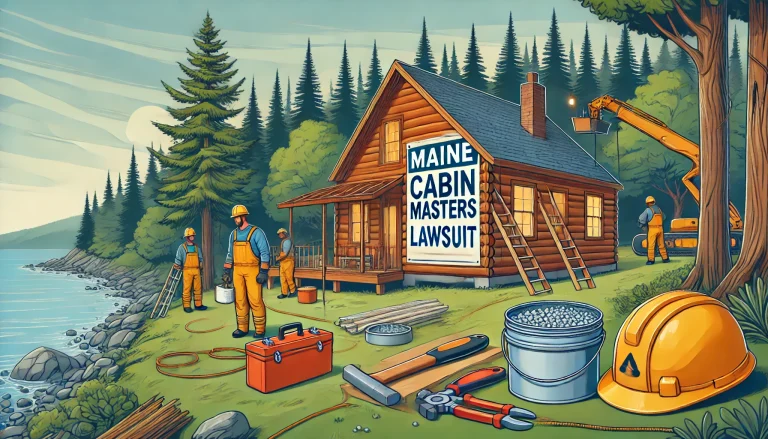The Maine Cabin Masters lawsuit, involving the popular reality TV show, captured attention due to allegations of lead safety violations during the restoration of old cabins in Maine. Hosted by contractor Chase Morrill and his team, the show has become a beloved fixture for fans who enjoy seeing vintage cabins transformed into beautiful, modern living spaces.
However, in 2022, the show’s production company, Kennebec Property Services LLC, faced legal action filed by the U.S. Environmental Protection Agency (EPA) for failing to comply with important safety laws regarding lead paint during renovations. This case underscored the critical importance of lead safety in home renovations, especially for older properties.
Background of the Show
Maine Cabin Masters focuses on the restoration of old cabins in Maine, many of which were built in the 19th and early 20th centuries. The show’s premise revolves around the team’s efforts to preserve the rustic charm of these cabins while updating them for modern use. These projects often involve significant renovation work, from structural improvements to cosmetic changes, with each episode showcasing the team’s skill and creativity. As is common with many older homes, these cabins may contain lead-based paint, which can present serious health risks when disturbed during renovation.
Understanding the Maine Cabin Masters Lawsuit and Its Implications
The Maine Cabin Masters lawsuit brought attention to the importance of adhering to safety regulations in home renovations, particularly those involving older properties with potential lead hazards. The case revolved around allegations that the show’s production company, Kennebec Property Services LLC, violated the EPA’s Lead Renovation, Repair, and Painting (RRP) Rule. This regulation is crucial for protecting homeowners and workers from the harmful effects of lead exposure, especially during renovations on pre-1978 buildings.
The violations included failing to obtain proper certification, not assigning certified renovators to projects, and neglecting to inform homeowners about lead safety risks. These actions posed potential health risks, as lead exposure can cause serious issues, such as developmental delays in children and long-term health problems in adults.
The lawsuit resulted in a settlement where the company paid a penalty, committed to safety compliance, and agreed to educate the public about lead hazards through their platform. This case serves as a reminder of the critical role safety standards play in renovations and highlights the responsibility of media to raise awareness about such issues.
Violations Alleged by EPA
The allegations against Kennebec Property Services centered on several key violations of the RRP Rule:
Failure to Obtain Certification
The company did not obtain the required certification to perform renovations in homes with lead-based paint. The RRP Rule requires that any renovator working on such properties be certified by the EPA to ensure they follow safe practices.
Lack of Certified Renovators
The renovations performed by Kennebec Property Services were not overseen by a certified renovator. The RRP Rule mandates that a certified individual must be in charge of overseeing the renovation work to ensure that proper safety procedures are followed, especially when dealing with lead-based materials.
Failure to Provide Lead Hazard Information
The law requires that homeowners be given an EPA-approved pamphlet outlining the dangers of lead exposure and how to protect themselves during the renovation process. The company allegedly failed to distribute this vital information.
Inadequate Record-Keeping
Under the RRP Rule, renovators are required to maintain records demonstrating that they complied with lead safety regulations. Kennebec Property Services reportedly did not keep these necessary records, making it difficult to prove that they had followed the law.
These violations were serious, as lead exposure is a well-known health hazard, particularly to young children, pregnant women, and pets.
Details of the Settlement
To resolve the case, Kennebec Property Services reached a settlement agreement with the EPA. As part of the settlement, the company agreed to the following:
Monetary Penalty
The company paid a fine of $16,500. This penalty was intended to reinforce the seriousness of the violations and encourage future compliance with the RRP Rule.
Certification and Compliance
Kennebec Property Services is committed to obtaining the necessary certification to comply with the RRP Rule moving forward. They also agreed to ensure that all future renovation projects adhere to the safety standards set by the EPA.
Raising Public Awareness
One of the key components of the settlement was the company’s commitment to raising awareness about lead safety. They agreed to feature lead safety practices in at least three episodes of Maine Cabin Masters. Additionally, the show’s website would be updated with lead safety information, and a special podcast episode would be created to educate viewers about the risks of lead exposure and the importance of following proper safety protocols during renovations.
This settlement allowed the company to continue working on its renovation projects while also taking important steps to prevent future violations and protect the public from lead exposure.
Why Lead Safety is Critical
Lead-based paint remains a serious health risk, especially in homes built before 1978. Lead poisoning can cause irreversible damage, particularly in young children. Even low levels of lead exposure can result in developmental issues, such as reduced IQ, learning disabilities, and behavioral problems. In adults, lead exposure has been linked to high blood pressure, kidney damage, and reproductive issues.
Lead hazards are particularly common in older homes where the paint may be deteriorating or being disturbed during renovation. The EPA’s Lead Renovation, Repair, and Painting (RRP) Rule was designed to address these risks by ensuring that anyone involved in renovation work on these homes is trained and certified to handle lead safely.
Implications for Home Renovation Shows
The Maine Cabin Masters lawsuit also highlights the responsibility of television shows to model safe and responsible practices in home renovations. As a popular reality show, Maine Cabin Masters has a wide-reaching influence on its viewers, many of whom may be inspired to undertake their own renovation projects. The lawsuit shows that entertainment shows must prioritize safety, both for the homeowners featured on the program and for viewers who may try to replicate the renovation work at home.
The EPA’s involvement in this case underscores the importance of not only complying with federal safety regulations but also using platforms like television to educate the public about those regulations. In the case of Maine Cabin Masters, the settlement required the company to go beyond compliance and actively promote lead safety through educational content.
Impact on Maine Cabin Masters
The lawsuit and subsequent settlement had a significant impact on Maine Cabin Masters. The show’s producers and team members took immediate action to ensure that all future renovations would adhere to lead safety protocols. This involved obtaining the necessary RRP certifications and committing to ongoing education about lead safety.
The show also made changes to its content, with the inclusion of educational segments on lead safety and the importance of following the RRP Rule. This not only helped the show comply with the settlement terms but also provided an opportunity to inform viewers about a critical issue they may not have been aware of.
Public Reactions and Media Coverage
When news of the lawsuit broke, it attracted media attention, especially because Maine Cabin Masters is a well-known and much-loved show. While some viewers were surprised by the legal issues, the overall response was supportive of the EPA’s actions. Many people expressed appreciation for the increased awareness of lead safety and the steps the company was taking to prevent future violations.
The case also sparked broader conversations about the importance of lead safety during renovations. Media outlets and experts used the case as a teaching moment to inform the public about the risks of lead exposure and the importance of hiring certified professionals for home renovations.
Lessons Learned
The Maine Cabin Masters lawsuit serves as a cautionary tale for both home renovation companies and TV shows alike. It demonstrates the serious consequences of neglecting lead safety regulations and highlights the need for proper certification and safety protocols when working on older homes. It also shows the importance of maintaining accurate records and providing homeowners with the necessary information about lead hazards.
For television shows, the case underscores the responsibility to educate viewers on safety issues. TV programs that feature home renovations should ensure that the practices they showcase align with current safety standards and regulations to prevent viewers from unknowingly putting themselves at risk.
Conclusion
The Maine Cabin Masters lawsuit was a significant turning point for the show and the renovation industry at large. While the lawsuit highlighted serious violations of lead safety rules, it also initiated positive changes aimed at protecting the public in the future. By settling the case, the company not only paid a penalty but also committed to strict adherence to safety protocols and played an active role in educating the public about lead hazards.
This case emphasizes the importance of lead safety during home renovations and underscores the vital role of media in raising public health awareness. The Maine Cabin Masters lawsuit ultimately became an opportunity for the show to improve and set an example for other renovation companies and TV programs.
FAQs
What was the main reason for the EPA lawsuit against Maine Cabin Masters?
The EPA alleged violations of the Lead Renovation, Repair, and Painting (RRP) Rule during renovations on pre-1978 properties.
What penalty did Kennebec Property Services face?
They paid a $16,500 fine and committed to raising public awareness about lead safety.
How does lead exposure affect health?
Lead poisoning can cause irreversible damage, including reduced IQ, learning disabilities, and health issues in both children and adults.
What steps did the company take after the lawsuit?
They obtained certification, pledged compliance, and incorporated lead safety education into Maine Cabin Masters content.
Why is the RRP Rule important for renovations?
The RRP Rule ensures safe handling of lead-based paint, protecting homeowners, workers, and the public from harmful lead exposure.
Article Recommendations
Third Culture Bakery Lawsuit: How Public Opinion Influences Intellectual Property Decisions
Abilene Asbestos Legal Question: How to Identify, Handle, and Seek Justice for Asbestos Exposure
Vermont Mesothelioma Legal Question: How Vermont’s Statute of Limitations Impacts Your Case




